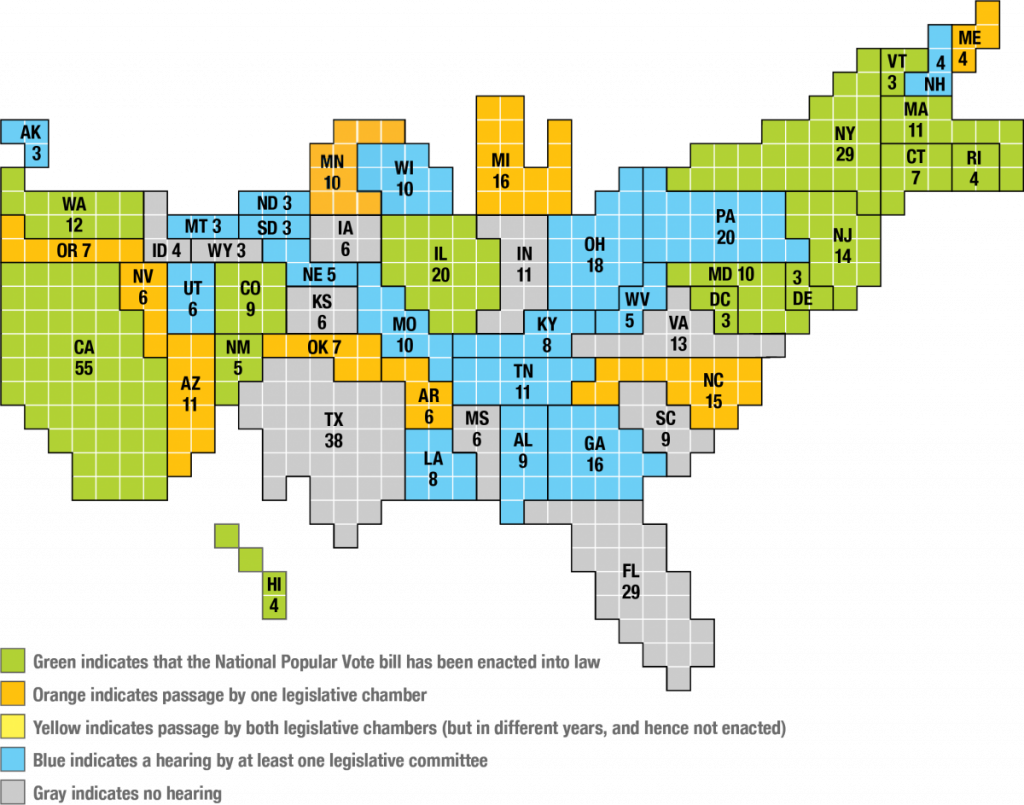Frank McNulty – former speaker of the Colorado House of Representatives – was on the radio earlier this month urging Coloradans to remove themselves from the National Popular Vote Interstate Compact (NPVIC) via a proposed ballot initiative.
Last year, Colorado passed a law joining the NPVIC — a limited interstate agreement to allocate electoral college votes to the popular victor of future presidential elections, if more than half of the electoral college agrees to it.
Around one-third of all electoral votes are assigned to jurisdictions currently belonging to the compact and roughly 20 percent of the electoral votes are in states currently deciding on NCVIP-related legislation.
On KOA News Radio’s Mandy Connell Show, McNulty listed some arguments for the electoral college and recounted his campaign’s progress – almost entirely centered on the signature drive for the proposed ballot initiative.
McNulty said the Colorado recall initiative needs 125,000 signatures to make it on the ballot in 2020.
“As of this last weekend, the signatures that were submitted pushed us over the 100,000-signature mark,” McNulty said on June 6.
Still, he said on air that the campaign is shooting for 200,000 signers – due in part to his concerns over the secretary of state’s office somehow undermining the initiative.
McNulty said the deadline for the requisite 125,000 signatures is August 1.
He said University of Colorado Regent Heidi Ganahl and Will Armstrong – son of former U.S. Sen. Bill Armstrong – have recently joined the effort in official capacities.
“I think people fundamentally understand that this attack against the electoral college is an attack against our republican form of government… that our founders were so inspired to form,” McNulty said.
“Last week, we saw the Nevada governor – a Democrat – veto the national popular vote scheme there,” he said.
The NPVIC “could diminish the role of smaller states like Nevada in national electoral contests and force Nevada’s electors to side with whoever wins the nationwide popular vote,” tweeted Nevada Gov. Steve Sisolak last month.
But there’s no consensus on if abolishing the electoral college would be inherently disempowering for small or low-population states.
National Popular Vote (NPV) — an organization promoting the compact — argues on its website that the disproportionate focus on battleground states does more to disempower small states now than a potentially successful compact would.
“Political power in presidential elections comes from being a closely divided battleground state,” the website says, “and almost all of the small states are noncompetitive states in presidential elections.
“The 12 small non-battleground states have about the same population as the closely divided battleground state of Ohio,” the site states, and “40 electoral votes—more than twice Ohio’s 18 electoral votes.”
Still, the NPV says the Buckeye state received 73 post-convention campaign events in 2012 while the 12 small states had zero.
Opposition to McNulty’s ballot initiative transcends feelings about the compact.
On Tuesday, the Grand Junction Daily Sentinel condemned recent recall efforts and the ballot initiative.
“We send delegates to the capital to do the people’s business,” the paper said. “If you don’t like how they’re conducting business, the proper remedy is to vote them out of office.
“Efforts to ‘cure’ legislative action through the citizen’s initiative process,” it continued, “defeat the purpose of representation.”
The NPVIC looks to shift the outcomes of a constitutionally-constructed institution without actually amending the constitution.
It’s an example of states attempting to directly influence the federal government.
The jurisdictions involved with the compact aren’t dismantling the electoral college. What they’re looking to do is nullify the institution’s impact via its own authority.
As of right now – according to a group supporting the NPVIC – 28 jurisdictions are in the compact.

This includes several small ones like Hawaii, Delaware and Vermont in addition to Rhode Island and Washington D.C.
The NPVIC currently has 196 of the 270 electoral votes it needs to effectively nullify the electoral college.
McNulty said many believe “that if Colorado sticks with this national popular vote scheme, our votes for president go to… states with much larger populations.
“It’s awesome seeing the patriots out there carrying petitions and fighting to save our republic,” he said.
Check out the interview below.



